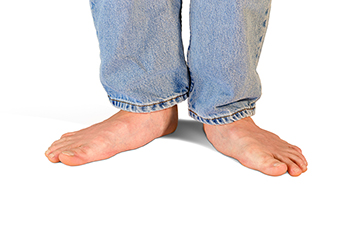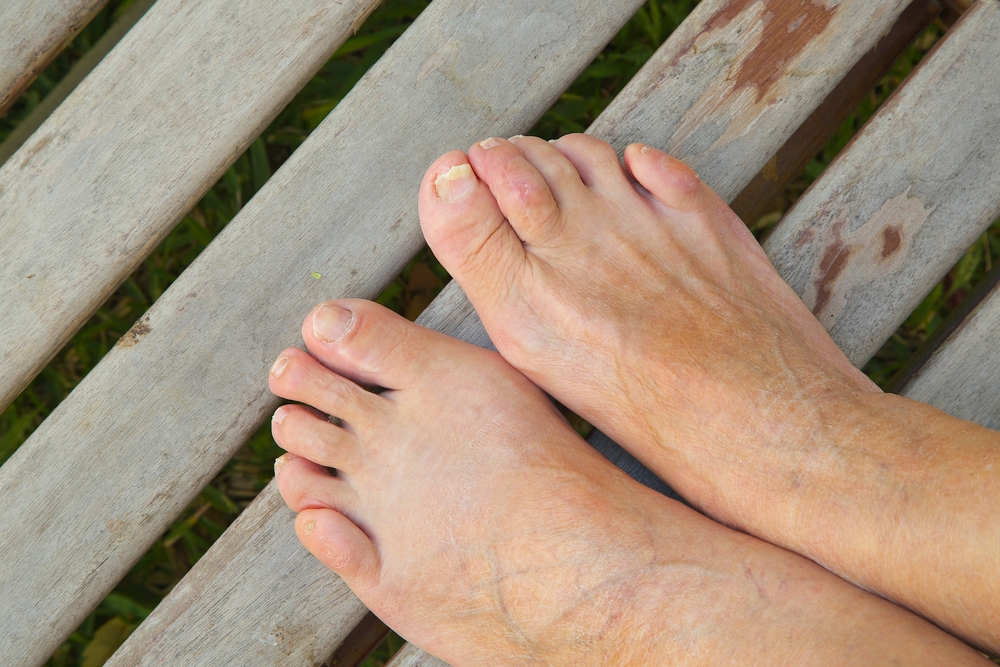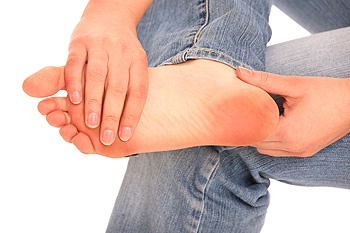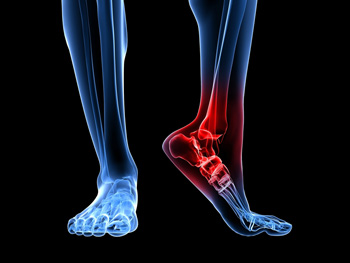Items filtered by date: March 2022
What Are Flat Feet?
 One has flat feet when one or both feet have fallen arches. Flat feet are common in babies and young children as part of normal growth and development of the foot and often do not cause symptoms. Flat feet in adults can have numerous causes, including weak or torn tendons, deformities from rheumatoid arthritis, broken bones in the middle of the foot, and injuries to ligaments. As one becomes older and more active, pain from flat feet can be felt in the heels or arches of the feet or even in the knees, hips, and lower back after prolonged standing, walking, or activity. Those with weight problems, diabetes or who are pregnant are more apt to feel discomfort from flat feet. If any kind of ongoing pain develops in the feet or ankles, visiting a podiatrist can help diagnose and treat the problem. If flat feet are suspected, the podiatrist may recommend lifestyle changes, rest, stretching exercises, physical therapy, more supportive shoes, arch supports, and over-the-counter pain medications.
One has flat feet when one or both feet have fallen arches. Flat feet are common in babies and young children as part of normal growth and development of the foot and often do not cause symptoms. Flat feet in adults can have numerous causes, including weak or torn tendons, deformities from rheumatoid arthritis, broken bones in the middle of the foot, and injuries to ligaments. As one becomes older and more active, pain from flat feet can be felt in the heels or arches of the feet or even in the knees, hips, and lower back after prolonged standing, walking, or activity. Those with weight problems, diabetes or who are pregnant are more apt to feel discomfort from flat feet. If any kind of ongoing pain develops in the feet or ankles, visiting a podiatrist can help diagnose and treat the problem. If flat feet are suspected, the podiatrist may recommend lifestyle changes, rest, stretching exercises, physical therapy, more supportive shoes, arch supports, and over-the-counter pain medications.
Flatfoot is a condition many people suffer from. If you have flat feet, contact Dr. Joshua David Scoll from Pennsylvania. Our doctor will treat your foot and ankle needs.
What Are Flat Feet?
Flatfoot is a condition in which the arch of the foot is depressed and the sole of the foot is almost completely in contact with the ground. About 20-30% of the population generally has flat feet because their arches never formed during growth.
Conditions & Problems:
Having flat feet makes it difficult to run or walk because of the stress placed on the ankles.
Alignment – The general alignment of your legs can be disrupted, because the ankles move inward which can cause major discomfort.
Knees – If you have complications with your knees, flat feet can be a contributor to arthritis in that area.
Symptoms
- Pain around the heel or arch area
- Trouble standing on the tip toe
- Swelling around the inside of the ankle
- Flat look to one or both feet
- Having your shoes feel uneven when worn
Treatment
If you are experiencing pain and stress on the foot you may weaken the posterior tibial tendon, which runs around the inside of the ankle.
If you have any questions please feel free to contact one of our offices located in Philadelphia, Bensalem, and Fairless Hills, PA . We offer the newest diagnostic and treatment technologies for all your foot and ankle needs.
Why Do I Have Nighttime Pain In My Feet?
There are several conditions that cause foot pain that worsens in the evening or interrupts sleep. Fibromyalgia is a chronic condition causing musculoskeletal pain, burning, tenderness, and tightness which often occurs in the feet. These symptoms can be worse in the evening due to decreased levels of cortisol. Tarsal tunnel syndrome is a condition where the tibial nerve in your ankle becomes compressed, causing pain, numbness, tingling, or a pins and needles sensation in your feet that may flare up at night. Bony bunions that get irritated rubbing against shoes during the day are often sore at night and throb. Peripheral neuropathy (damage to nerves outside of the central nervous system) can cause painful sensations such as tingling, burning or sharp pains, which tend to intensify due to cooler nighttime temperatures. If you are experiencing any type of nighttime pain or discomfort in your feet or ankles, it is suggested that you get your condition diagnosed and treated by a podiatrist.
Foot Pain
Foot pain can be extremely painful and debilitating. If you have a foot pain, consult with Dr. Joshua David Scoll from Pennsylvania. Our doctor will assess your condition and provide you with quality foot and ankle treatment.
Causes
Foot pain is a very broad condition that could be caused by one or more ailments. The most common include:
- Bunions
- Hammertoes
- Plantar Fasciitis
- Bone Spurs
- Corns
- Tarsal Tunnel Syndrome
- Ingrown Toenails
- Arthritis (such as Gout, Rheumatoid, and Osteoarthritis)
- Flat Feet
- Injury (from stress fractures, broken toe, foot, ankle, Achilles tendon ruptures, and sprains)
- And more
Diagnosis
To figure out the cause of foot pain, podiatrists utilize several different methods. This can range from simple visual inspections and sensation tests to X-rays and MRI scans. Prior medical history, family medical history, and any recent physical traumatic events will all be taken into consideration for a proper diagnosis.
Treatment
Treatment depends upon the cause of the foot pain. Whether it is resting, staying off the foot, or having surgery; podiatrists have a number of treatment options available for foot pain.
If you have any questions, please feel free to contact one of our offices located in Philadelphia, Bensalem, and Fairless Hills, PA . We offer the newest diagnostic and treatment technologies for all your foot care needs.
Heel Pain Can Be Treated!
What Causes Running Injuries?
 Running can be great exercise but must be done with care to prevent injuries that can keep you off your feet. The most common cause of running injuries is overtraining. If you run too many miles, too quickly, and too often, you put an enormous amount of strain on your feet and ankles, significantly increasing your risk of injury. To stop this from happening, remember that slow and steady wins the race. Increase the distance, speed, or frequency of your runs one by one and slowly over time. Another common culprit behind running injuries is wearing the wrong shoes. Look for running shoes that fit properly and offer cushioning and support. If you’re a runner, a podiatrist can help you by treating any existing foot or ankle issues, prescribing orthotics if needed, and educating you about injury prevention.
Running can be great exercise but must be done with care to prevent injuries that can keep you off your feet. The most common cause of running injuries is overtraining. If you run too many miles, too quickly, and too often, you put an enormous amount of strain on your feet and ankles, significantly increasing your risk of injury. To stop this from happening, remember that slow and steady wins the race. Increase the distance, speed, or frequency of your runs one by one and slowly over time. Another common culprit behind running injuries is wearing the wrong shoes. Look for running shoes that fit properly and offer cushioning and support. If you’re a runner, a podiatrist can help you by treating any existing foot or ankle issues, prescribing orthotics if needed, and educating you about injury prevention.
Exercising your feet regularly with the proper foot wear is a great way to prevent injuries. If you have any concerns about your feet, contact Dr. Joshua David Scoll of Pennsylvania. Our doctor will treat your foot and ankle needs.
How to Prevent Running Injuries
Many common running injuries are caused by overuse and overtraining. When the back of the kneecap starts wearing out and starts causing pain in your knee, this is commonly referred to as runner’s knee. Runner’s knee is a decrease in strength in your quadriceps and can occur if you’re not wearing properly fitted or supporting shoes. To prevent runner’s knee, focusing on hip strengthening is a good idea, as well as strengthening your quads to keep the kneecaps aligned.
What Are Some Causes of Running Injuries?
- One cause of a common running injury is called iliotibial band syndrome.
- Plantar fasciitis is also another common injury.
- Stress fractures can occur from overtraining, lack of calcium, or even your running style.
Best Ways to Prevent Running Injuries
- Wear footwear that fits properly and suits your running needs.
- Running shoes are the only protective gear that runners have to safeguard them from injury.
- Make a training schedule. Adding strengthening exercises as well as regular stretching can help keep you strong and limber and can lessen the possibility of injuries.
- Stretching keeps muscles limber; this will help you gain better flexibility.
If you have any questions please feel free to contact one of our offices located in Philadelphia, Bensalem, and Fairless Hills, PA . We offer the newest diagnostic and treatment technologies for all your foot and ankle needs.
What to Do After Hammertoe Surgery
 During hammertoe surgery, the deformed toe is straightened to relieve pain and improve your quality of life. General recovery from hammertoe surgery usually takes around six weeks. After your surgery, it is very important to follow your doctor’s instructions so that your toe can heal properly. At home, elevate and rest your foot as often as you can. Wear wide, comfortably fitting shoes that give your toes plenty of space and avoid high heeled shoes. You may be prescribed medications to relieve pain and prevent infection, which you should take as directed. You may also be asked to avoid certain activities to keep pressure off your foot. For more information about surgical aftercare, please consult with your podiatrist.
During hammertoe surgery, the deformed toe is straightened to relieve pain and improve your quality of life. General recovery from hammertoe surgery usually takes around six weeks. After your surgery, it is very important to follow your doctor’s instructions so that your toe can heal properly. At home, elevate and rest your foot as often as you can. Wear wide, comfortably fitting shoes that give your toes plenty of space and avoid high heeled shoes. You may be prescribed medications to relieve pain and prevent infection, which you should take as directed. You may also be asked to avoid certain activities to keep pressure off your foot. For more information about surgical aftercare, please consult with your podiatrist.
Hammertoe
Hammertoes can be a painful condition to live with. For more information, contact Dr. Joshua David Scoll from Pennsylvania. Our doctor will answer any of your foot- and ankle-related questions.
Hammertoe is a foot deformity that affects the joints of the second, third, fourth, or fifth toes of your feet. It is a painful foot condition in which these toes curl and arch up, which can often lead to pain when wearing footwear.
Symptoms
- Pain in the affected toes
- Development of corns or calluses due to friction
- Inflammation
- Redness
- Contracture of the toes
Causes
Genetics – People who are genetically predisposed to hammertoe are often more susceptible
Arthritis – Because arthritis affects the joints in your toes, further deformities stemming from arthritis can occur
Trauma – Direct trauma to the toes could potentially lead to hammertoe
Ill-fitting shoes – Undue pressure on the front of the toes from ill-fitting shoes can potentially lead to the development of hammertoe
Treatment
Orthotics – Custom made inserts can be used to help relieve pressure placed on the toes and therefore relieve some of the pain associated with it
Medications – Oral medications such as anti-inflammatories or NSAIDs could be used to treat the pain and inflammation hammertoes causes. Injections of corticosteroids are also sometimes used
Surgery – In more severe cases where the hammertoes have become more rigid, foot surgery is a potential option
If you have any questions please contact one of our offices located in Philadelphia, Bensalem, and Fairless Hills, PA . We offer the newest diagnostic and treatment technologies for all your foot and ankle needs.
Heel Pain Location May Provide Clues to Its Cause
Heel pain is a very common occurrence. It is usually felt under the heel or at the back of the heel. When pain and inflammation is located on the bottom of the heel toward the front of the foot, plantar fasciitis is typically the cause. Plantar fasciitis is a painful inflammation of the plantar fascia tissue, which runs along the bottom of the foot and connects the heel with the toes. Other causes of heel pain on the bottom of the foot may be attributed to heel pad atrophy or heel spurs. If pain is felt at the back of the heel, Achilles tendonitis is often at the root of the cause. This condition occurs when the Achilles tendon, which attaches to the back of the heel bone, becomes damaged or torn over time, causing pain and swelling. Other possible causes include bursitis, Sever’s disease, and heel bumps. Pain from a heel stress fracture can occur anywhere on the heel, and tarsal tunnel syndrome can cause heel pain underneath the ankle bone. Heel pain can also be caused by neurological issues, infections and arthritis. Unless you suffer an acute injury, heel pain typically starts out mild, but can become severe. If you are experiencing any type of heel pain, don’t hesitate to contact a podiatrist to find out the cause and take measures to keep it from worsening or becoming chronic or debilitating.
Many people suffer from bouts of heel pain. For more information, contact Dr. Joshua David Scoll of Pennsylvania. Our doctor can provide the care you need to keep you pain-free and on your feet.
Causes of Heel Pain
Heel pain is often associated with plantar fasciitis. The plantar fascia is a band of tissues that extends along the bottom of the foot. A rip or tear in this ligament can cause inflammation of the tissue.
Achilles tendonitis is another cause of heel pain. Inflammation of the Achilles tendon will cause pain from fractures and muscle tearing. Lack of flexibility is also another symptom.
Heel spurs are another cause of pain. When the tissues of the plantar fascia undergo a great deal of stress, it can lead to ligament separation from the heel bone, causing heel spurs.
Why Might Heel Pain Occur?
- Wearing ill-fitting shoes
- Wearing non-supportive shoes
- Weight change
- Excessive running
Treatments
Heel pain should be treated as soon as possible for immediate results. Keeping your feet in a stress-free environment will help. If you suffer from Achilles tendonitis or plantar fasciitis, applying ice will reduce the swelling. Stretching before an exercise like running will help the muscles. Using all these tips will help make heel pain a condition of the past.
If you have any questions please contact one of our offices located in Philadelphia, Bensalem, and Fairless Hills, PA . We offer the newest diagnostic and treatment technologies for all your foot and ankle needs.



